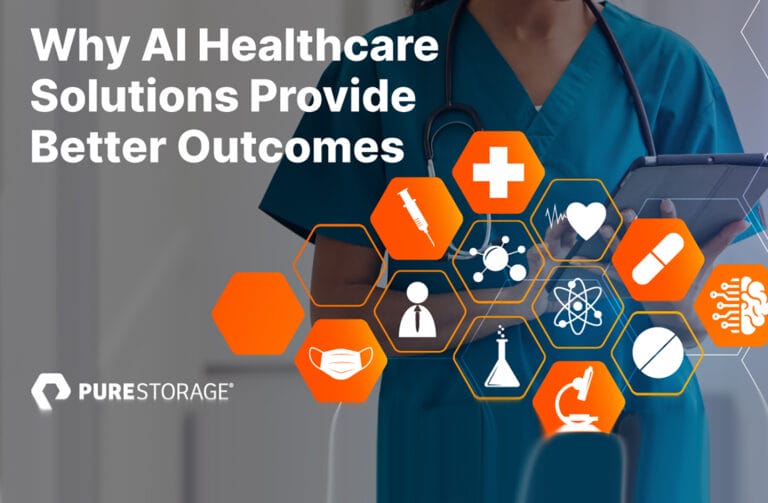Artificial intelligence, or AI, has the potential to revolutionize the medical world as we know it. The incredible capabilities offered by powerful databases that can replicate and, in many cases, exceed the way humans think is a potent force multiplier.
Healthcare AI can be applied across a broad spectrum of uses, but these generally occur in three progressive categories. As described by McKinsey & Company, the first comprises replacing human effort in “repetitive and largely administrative tasks,” which can take up substantial amounts of provider time and energy. AI healthcare has already established a solid foothold by automating efforts ranging from routine patient and customer service roles to making paperwork and documentation more efficient. At a deeper level, healthcare AI can be used in diagnostic analytics, deep-diving into detailed data and generating insights much more involved than would be possible with strictly human effort.
The second major phase of AI healthcare will permit a transition of many services from being provided exclusively in a clinical environment to more home-based care. Again according to McKinsey, applications such as healthcare AI-powered alerting systems, remote monitoring, and virtual assistants will assist providers by expanding their reach to a setting that is more comfortable and often more conducive to effective patient care and healing.
Finally, we can expect healthcare AI solutions to be implemented deeply into daily clinical practices, even taking over portions of patient procedures. AI healthcare solutions are already being tested to augment surgical techniques with virtual reality and become responsible for routine tasks like suturing. The overall result would be a hybrid experience for the patient where individuals would interact with both human medical providers and a series of healthcare AI systems.
What is the Purpose of Artificial Intelligence within the Healthcare System?
The overarching purpose of this development won’t be to replace doctors and nurses. Instead, practical applications of healthcare AI will augment provider capabilities to focus on what they’re best at: patient care. Ideally, the more deeply AI is integrated into healthcare, the more human interaction patients can expect to experience.
Additional goals of healthcare AI integration include lower costs, faster service times, and a more customized standard of care. Experiments in machine learning genomics using AI healthcare are already being conducted with positive results, customizing pharmacology and treatment recommendations based on a patient’s unique genetic markers and family history. One common societal concern is that medical care will suffer by being treated by “robots,” which implies that individuals will experience a lower and more industrialized standard of care. Based on its applications so far, the opposite is happening.
How Can Artificial Intelligence Be Used in Healthcare and Technology?
As discussed in the three-phase model listed above, AI healthcare can be used in various applications. One example of direct patient interaction is the implementation of Virtual Health Assistants. VHAs are sophisticated systems that vary from advanced chatbots to roles that are more akin to personal assistants. Unlike generic versions of chatbots used in retail customer service applications (which generally trigger more frustration than satisfaction), the advanced versions healthcare AI uses can be viewed as windows into the medical community, giving patients access to more knowledge and information than was previously available.
When used as personal assistants, healthcare AI can take over substantial portions of responsibilities in specific communities, such as individuals who struggle with dementia. Picture a system that can be integrated into a household and remind dementia patients when to take their medications, what foods can be consumed at certain windows, and deliver timely reminders for appointments. These systems can likely be integrated into commercial AI applications for home security and climate control to enable a higher level of independence than ever experienced.
What are the Benefits of Using an AI-Based System in Medical Diagnostics?
Healthcare AI’s benefits to providers and patients alike can be summarized in three areas: depth, breadth, and customization. AI healthcare has an unprecedented capacity for sifting through tremendous amounts of information in short periods, giving medical providers the ability to maximize the depth of care previous generations have only dreamed of.
Additionally, AI healthcare can incorporate the most recent medical research at a speed not yet experienced in medicine, drawing from scientific studies conducted across the globe. This breadth of data would be unavailable without robust healthcare AI systems that can sift through literal mountains of data and provide the most poignant recommendations for patient care.
Combining these benefits through healthcare AI will permit a tremendously personalized experience in medical diagnostics. Faster imaging, more accurate diagnoses, and customized recommendations that take a patient’s history and individual genetic markers into consideration will equip doctors and nurses to provide an unprecedented level of service. The full incorporation of AI healthcare will improve patient outcomes across the board, from surgery to home health.
What are the Benefits of Artificial Intelligence to Healthcare?
When incorporated effectively, AI healthcare can be accurately viewed as the most powerful augmentation tool ever developed. One-quarter of the Western population will be 65 or older by 2050, and this requires a tremendous increase in healthcare professionals—sooner rather than later. In fact, economists project that there will be a 3% increase of available jobs across all nursing occupations in the next decade, and the human supply simply doesn’t exist to meet this need.
However, if doctors and nurses could be freed from 15% to 50% of their responsibilities, this would go a long way toward meeting existing and future needs. Those percentages correspond to the level of non-patient-centric responsibilities that various healthcare specialties must accomplish in their daily duties, and these are the prime targets for healthcare AI to assume. As it is fully integrated into the existing medical system, subsequent efficiencies could generate even more time returned to direct patient interactions and lessen the need for higher staffing levels.
What is the Future of Healthcare AI?
As AI healthcare evolves, more applications across the entire spectrum of the medical world can be anticipated. From research and diagnostics to patient care and direct interaction, we can expect healthcare AI to become an ever-present reality. The benefits are all-encompassing, creating faster, more flexible healthcare that can be more easily customized at a lower cost than would be available with a system operated exclusively by humans. However, the medical community has been clear in its desire to use healthcare AI to promote higher levels of personal interaction between providers and patients.
The end result of AI healthcare integration will be better outcomes, with more depth, breadth, and customization of medical care across all specialties. This will be more economical as fewer new professionals are needed and promote a higher standard for patient care.
![]()






